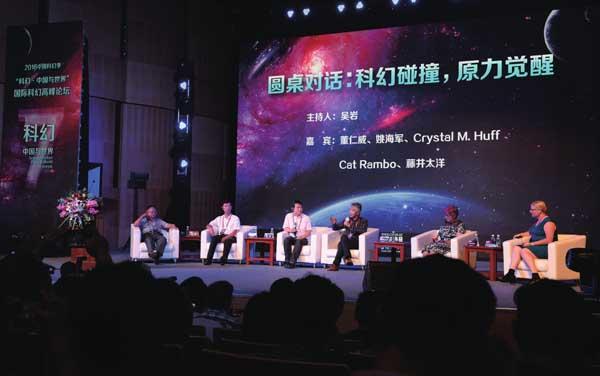A Whole New Universe
2016-05-14ByLuYan
By Lu Yan

Jiang Bo calls himself a tortoise. And like the tortoise in Aesops fable, tenacity is his second name. Also like the tortoise, this tenacity won him recognition when the 2016 Xingyun (Nebula) Award for Global Chinese Science Fiction was announced in Beijing on September 11 and the writer won the prize for best novel.
“Ive been writing sci-fi for 13 years,” the 38-year-old said in his acceptance speech, holding his trophy with a trembling hand. “I call myself a tortoise, like the one in the tale of the tortoise and the hare. It took me a long time to get to where I am now.”
Jiang scooped the coveted prize for his Heart of the Milky Way. Published this year, it is the last piece in his trilogy Heart of the Galaxy, coming after Sunset and Dark Abyss, the saga of a stupendous war between human beings and dark powers in space. There is speculation that this could be a new Star Wars screen epic from China, with Wanda Group, the worlds largest cinema chain operator, reportedly making a film based on the book.
The Nebula Award is an annual event launched in 2010. The only international award for sci-fi writing in Chinese, it is presented by the Chengdu-based World Chinese Science Fiction Association.
An early start
The first Chinese sci-fi can be traced back to the Qing Dynasty (1644-1911), when it served as a tool for conveying political thoughts. Liang Qichao (1873-1929), a famous scholar, journalist and reformer, published New Chinas Future in 1902, a fantasy fiction on Chinas transformation from 1902 to 1962. In it, Liang predicted the collapse of the Qing Dynasty as well as the holding of the World Expo in Shanghai, which came true 108 years later.
But despite the early start, Chinese science fiction remained a domestic phenomenon till something happened last year to catapult it into global limelight. When Liu Cixin, Chinas new literary sensation, wrote his Remembrance of the Earths Past trilogy, it became a bestseller. The first novel, The Three-Body Problem, opens a complex tale about the inhabitants of a doomed solar system searching to relocate to another planet for survival and deciding to invade Earth. It was translated into English by Ken Liu in 2014 and won the Hugo Award for Best Novel the following year.
The Hugo Award has been presented by the California-based World Science Fiction Society since 1963 for the best science fiction or fantasy story worldwide published in the previous calendar year in English. Liu Cixin is the first Asian writer to win the honor. Chinese scifi writers pens gained more power this year, when Hao Jingfang, following in Lius footsteps, won the 2016 Hugo Award with her novelette Folding Beijing, also translated by Ken Liu. It is the story of a futuristic city which is divided into three spaces, with each segment “living” for an allocated time and then going to sleep at which point others wake up and live their lives. When people sleep, the buildings in their sections also fold, collapse and go to sleep as well, from which the novelette gets its name.
With two Hugo awards in a row, Chinas scifi writers have gained unprecedented global attention. “This is a new period of rising, and the trend will continue in the coming years,” said Li Jun, better known by his pen name Baoshu, the winner of six Nebula awards.
Ruins of Time, which fetched Baoshu the 2014 Nebula, is one of the first attempts to combine Chinese sci-fi with a Western-style apocalypse theme. It is the story of a contemporary world trapped in a mysterious and unbreakable time loop due to an experiment that went wrong. However, a college student, Han Fang, and an enigmatic girl he meets are able to break the deadlock and restore normality.
Although sci-fi is still not considered a mainstream literary genre in China, nevertheless, the growing exposure and fame of Chinese scifi is a new window for the rest of the world to know about todays fast-evolving China. When U.S. President Barack Obama took a vacation in Hawaii at the end of 2015, the White House said his reading list included The Three-Body Problem.
“Chinese sci-fi writers can present Chinas history and values through their works. Foreigners can get a glimpse of how Chinese people think and how we live our lives,” explained Wu Yan, President of the World Chinese Science Fiction Association and Director of Beijing Normal Universitys Research Center for Science Fiction and Creative Education. The Three-Body Problem is set against the backdrop of China in the late 1960s, from where it leaps forward to the year 18906417. Though it blends reality with imagination, it nevertheless provides glimpses into Chinese peoples ways of life, culture and thinking.
Exploring new galaxies
Still, the Chinese sci-fi industry has a long way to go. According to statistics released by the China Association for Science and Technology at the 2016 China Science Fiction Conference on September 8, at the end of 2015, there were 80 million sci-fi readers or fans in China. While this is nearly a quarter of the U.S. population, the number of Chinese sci-fi publications equaled only one fifth that of U.S. sci-fi works.
A report published in Science Fiction World, Chinas most influential science fiction magazine, said although sci-fi publications in China grew in 2015, only 28 novels were published. In the United States, the figure was 396. “Currently sci-fi production is at a primary stage in China. The volume is far less than in the United States and Japan, whose sci-fi industries are a lot more mature,” said Yao Haijun, Associate Editor in Chief of Science Fiction World. “The number of writers who have published sci-fi works is 1,797 in the United States, a lot higher than the mere 210 in China.”
“Chinese sci-fi should explore the global market and vice versa,” Wu added. “I think more Chinese works will be translated into English and other languages.” He stressed the importance of quality translation and proficient translators, like Chinese-American Ken Liu, a scifi writer himself. “Had Ken Liu not translated Liu Cixins novel, the outcome might have been different. So it is important to get great translators. The government should increase its financial support in this respect.”
In March, the General Office of the State Council, Chinas cabinet, released an action plan for science literacy. It said that the government will implement policies supporting the development of sci-fi, animation, videos and games.
Sci-fi began to emerge in the 19th century and matured in the 20th century. Wu calls it a product of the times when the idea of scientific development being the future of humanity evolved. “Time changes so fast that the old scifi form doesnt fit the current demand,” he said.“We need a new literature form. Writers from all over the world are working on it. If we [Chinese writers] come up with it first, well be able to stand out.”
Baoshu thinks sci-fi success begins at home. “I think we should rethink the notion of going global, and focus more on catching the eyes of our countrymen. Win the hearts of the Chinese first and make reading sci-fi their hobby and habit,” he said. “As for gaining worldwide recognition, its a matter of time once the domestic market is ripe.”
